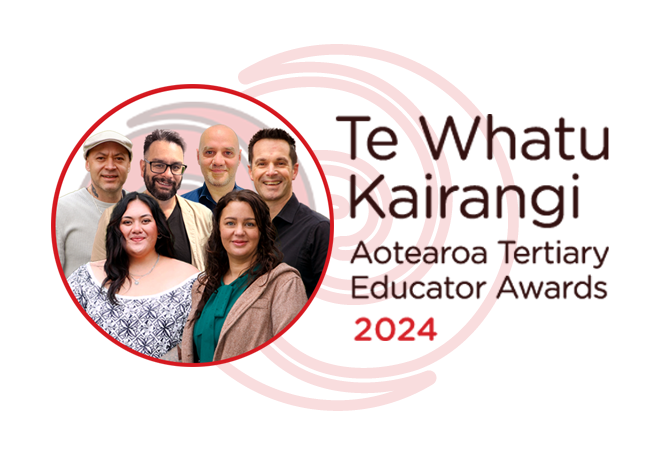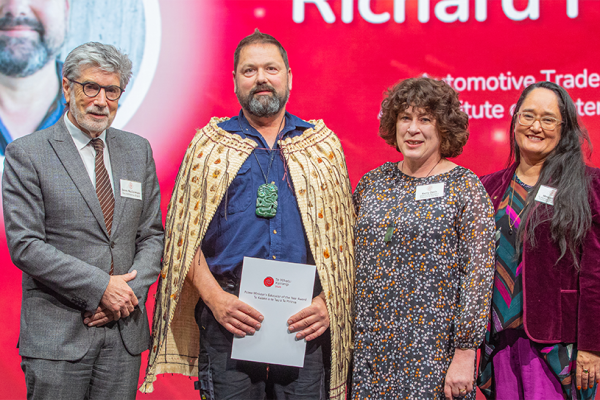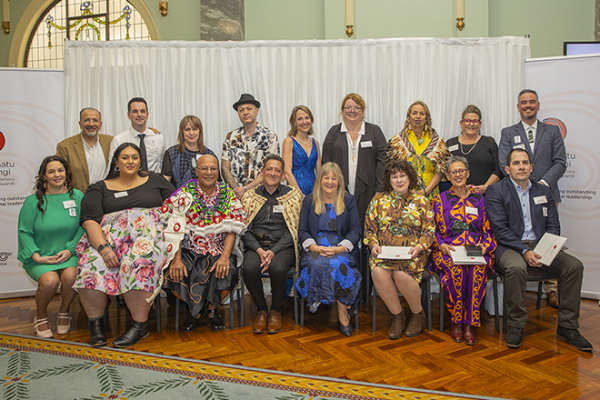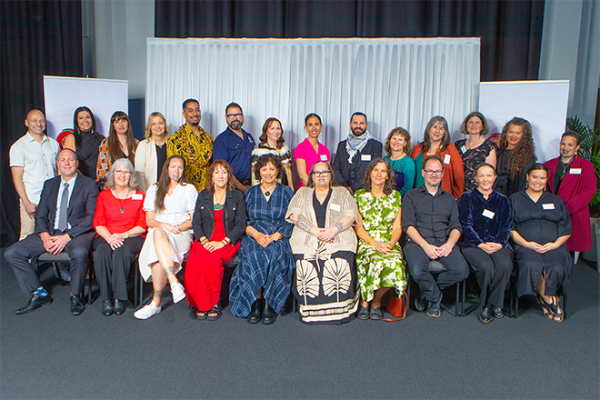Massey University Mental Health and Addiction Team
Decolonising mental health and addiction training in Aotearoa
Group Category winner: Innovation in learning, teaching, and curriculum
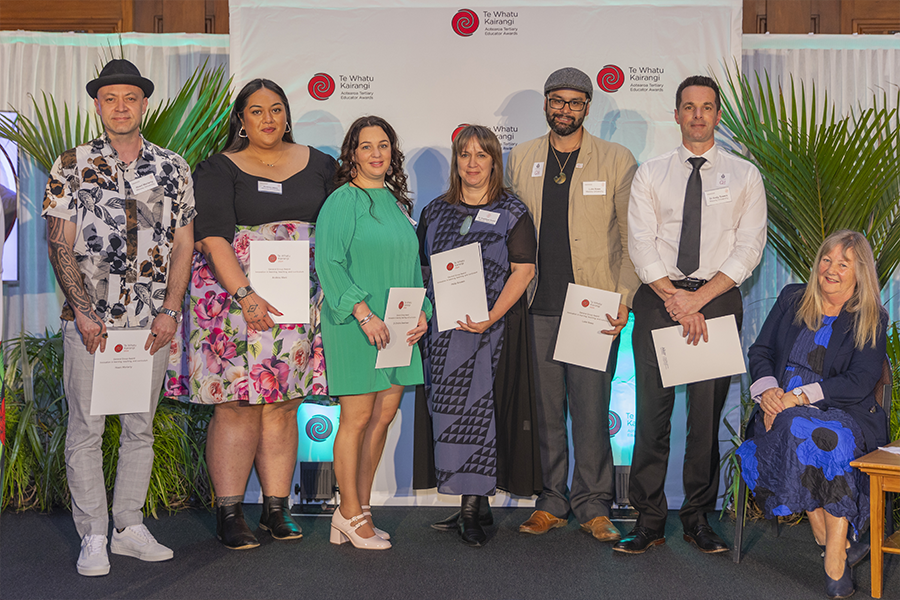
Massey University Mental Health and Addiction Team
Left to Right: Hoani Moriarty, Andrea Meni, Associate Professor Dr Chrissy Severinsen, Dr Angelique Reweti (accepting on behalf of Phil Brookes), Luke Rowe, Associate Professor Dr Andy Towers and Hon Penny Simmonds Minister of Tertiary Education and Skills.
“Their students learn to express and then implement the values of manaaki, whanaungatanga and aroha because that is how they are taught. This isn’t how clinical teaching is normally delivered, but it works. It's powerful, and it’s what we need to see more of in the sector.” (Te Whatu Ora Clinical Team Manager, 2024)
The Massey University Mental Health and Addiction Team (MHA) provides a comprehensive, interdisciplinary approach to mental health and addiction education. Inspired by numerous reviews highlighting the failure to address the needs of Māori and the absence of flexible training pathways, particularly the 2018 He Ara Oranga national review of mental health and addiction, the MHA programme was developed with the sector in 2019. Its major is a specialisation within the Bachelor of Health Science - the Bachelor of Health Science (Mental Health and Addiction) (BHlthScMHA). The programme offers two pathways: Addiction Practitioner for students wishing to become registered addiction practitioners and Mental Health Promotion for students wishing to work in mental health promotion, programme development, research and policy roles. The Bachelor of Health Science is a three-year undergraduate degree consisting of 24 courses (360 credits) delivered online.
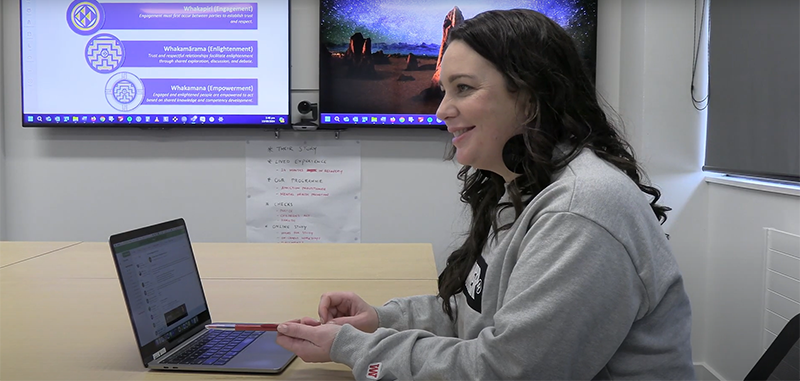
The MHA team, led by Associate Professors Andy Towers and Chrissy Severinsen, includes team members with expertise in public health, hauora Māori, Pacific health, mental health and addiction, and the social determinants of health. Its programme aligns with Te Tiriti o Waitangi and is co-delivered by Māori and non-Māori educators and practitioners. It prepares students to develop and implement innovative health solutions. It is delivered collaboratively by staff from the School of Health Sciences, School of Social Work, and Te Pūtahi a Toi School of Māori Knowledge, reflecting a commitment to Te Tiriti and honouring mātauranga Māori and social work practice. Several other Massey courses and programmes, including postgraduate public health, health promotion, psychology, the creative writing programme, and the University Teaching Academy’s new staff training course, have begun adopting elements of the framework.
The programme’s curriculum integrates hauora and public health perspectives, equipping students to support the diverse needs of individuals and communities. It aims to decolonise mental health and addiction training by challenging dominant Western perspectives and centring Māori conceptualisations of health. Rather than solely emphasising clinical skills, the MHA team provides a broad understanding of factors contributing to mental health and addiction challenges, preparing graduates to support tāngata whai ora in recovery. It emphasises a public health, community-based, strengths-focused approach, incorporating hauora and critical engagement skills. Central to its philosophy is creating learning experiences that positively contribute to the workforce and developing graduates passionate about supporting change, embracing respect, aroha, and hope, and collaborating to promote social justice and inclusion.
BHlthScMHA’s students come from diverse backgrounds and often face equity challenges when pursuing higher education. Rather than face-to-face training in urban institutions for small cohorts, the programme is designed with flexible online delivery to support equity and inclusion. Clinical assessment skills are taught alongside whānau engagement skills, mental health promotion, and hauora Māori approaches. This ensures a high-quality curriculum that enhances equity in health outcomes for Māori, prioritises whānau and community-led approaches, fosters cultural competencies, and reflects Te Tiriti o Waitangi-led practice. The curriculum is co-designed with MHA sector partners, including workforce development agencies (such as Te Pou and DAPAANZ), service managers and practitioners, Māori leaders, support services, and educational experts.
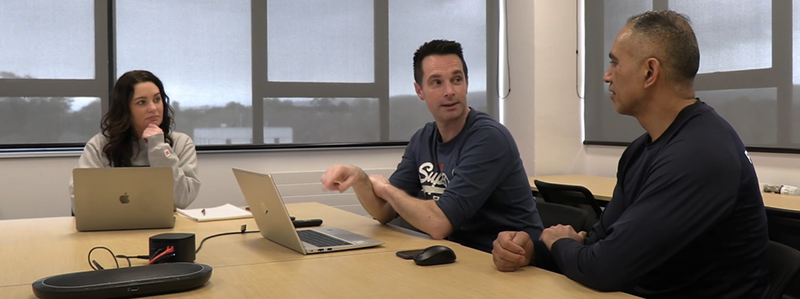
The team’s teaching and learning practice is guided by Durie’s (2008) Whakapiri, Whakamārama, Whakamana Framework, a relational model outlining three stages for working with tāngata whai ora in the mental health and addiction field. The first year (Whakapiri) emphasises relationship building, the second year (Whakamārama) focuses on Māori mental health and addiction work, and the third year (Whakamana) focuses on students becoming agents of social inclusion. The framework incorporates engagement strategies known to support retention, such as early and individualised student contact, consistent online staff presence, public recognition of learning and encouragement of interaction, prioritising dialogue and engagement activities, recognising lived experience and diverse identities, and promoting positive and reflective discussions among students. Online delivery is complemented by on-campus workshops, while the team engages in routine reflective hui, allowing it to continually refine its approach based on student feedback, assessment data, and observations. It also works closely with Massey’s disability support services to ensure that its course structure and multimodal content enhance accessibility and engagement for neurodiverse and disabled students.
The Whakapiri Framework is committed to embedding Māori knowledge systems and Māori language and culture in its curriculum design. Some ways of achieving this are starting online sessions with karakia, including relevant case studies, structuring readings and assessments to include mātauranga Māori, prioritising Māori and Pacific understandings of MHA concepts and approaches, and using Māori terms as standard terminology. The teaching team, consisting of mental health and public health experts, clinical practitioners, and health science tutors, provides a foundation from which to deliver content reflective of their strengths.
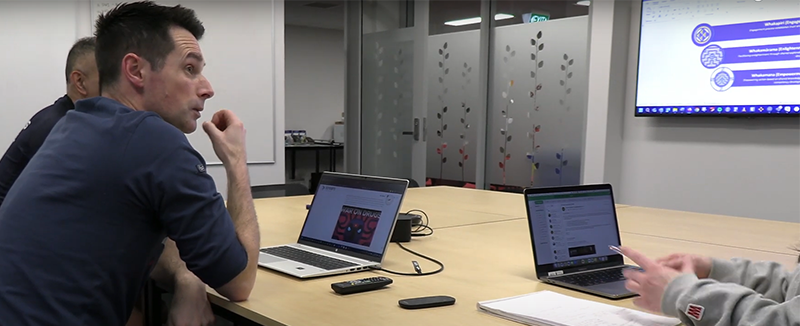
Redesigned and rolled out in 2020, the foundational MHA course (147102 Whakapiri) resulted in better class grades, fewer non-engaged students and an improvement of class grade point average (GPA) from 36% in 2020 to 60% in 2023. The MHA team has won two team teaching awards – the Council of Academic Public Health Institutions Australasia (CAPHIA) Teaching Excellence Award 2023 and the Massey University Learner Success, Retention, and Transitions Excellence Award 2023. Feedback from organisations hosting students on placement has been overwhelmingly positive and graduates’ success in the workforce, with a 100% employment rate post-graduation, reflects the high demand for the unique skill set and perspective the programme provides.
“Our collaborative teaching approach draws on the expertise across the Schools, reflecting the Tertiary Education Strategy's call for greater collaboration to support learner success.”
